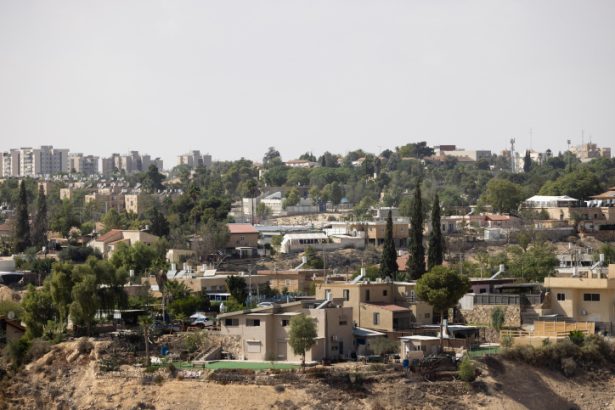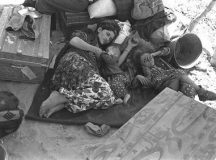Lyn Julius is the author of Uprooted: How 3000 Years of Jewish Civilization in the Arab World Vanished Overnight (2019) and the co-founder of Harif, an association of Jews from the Middle East and North Africa in the UK.
Can a shared love of ‘Arab culture’ be a force for moderation? More to the point, can it stop the ‘Second Israel’ from voting for the right-wing Benjamin Netanyahu and his ‘reckless, anti-democratic’ schemes? Sam Shube thinks so. His Hagar Association runs various initiatives bringing Arabs and Jews together, ‘leaving politics behind’.
Shube correctly identifies Bibi’s supporters as overwhelmingly of Mizrahi background – Jews from Arab and Muslim countries, who form over half the Israeli Jewish population. His solution: remind them of their ‘shared culture’ with the Arabs. Celebrating cultural roots that Arabs and Jews share can be the foundation of a truly democratic state.
But there are several fallacies with this line of thinking. My thoughts are informed in part by conversations held recently on a trip to Israel that took in Beersheva, Kiryat Malachi and Arad in the south.
Firstly, what ‘shared culture’ are we talking about? Despite Arabisation and Islamisation, Arabs themselves do not share a culture – the Arabs of Algeria and Morocco have very little in common with the Bedouins of Saudi Arabia or Jordan. Palestinian Arabic is not the same as Iraqi Arabic. The Berbers of Libya and Kurds of Iraq do not even speak the same language as their Arab compatriots.
If Arab society has a common denominator, it is a ‘shame-honour’ culture. According to an Arab friend, Arabs tend to ‘sweep under the carpet’ inconvenient facts, lest they lose face. Jews, he has observed, are not afraid to expose embarrassing facts. They are driven by guilt, he says. It is a very different way of thinking.
When Arab countries had Jewish communities, Jews interacted with Arabs in business and trade, but each community led siloed lives: Intermarriage was rare. Jews spoke their own dialects of Arabic and had their own, self-contained, rich religious culture.
Secondly, the culture of the Jews of Middle East and North Africa was not monolithically Arab. It is true that Jews and Arabs might share a love for the songs of Um Kalthum or Farid al-Atrash. Egyptian singers and films were very popular all over the Arab world in the 1930s and 1940s. But Jews also flocked to the cinema to see the latest American films. Many Jews living in Arab countries were influenced by Western culture, educated in French-speaking schools, bore European names, and many had a marked preference for Edith Piaf over Um Kalthum. No one took away pure Mizrahi-Arab culture from the Jews of Arab countries because many had lost it before they came to Israel.
It is true that Mizrahi-Arab music was sidelined by the Ashkenazi-dominated establishment in the 1950s and 1960s. (So was Yiddish culture.) But it is no longer true, and has not been true for decades. As early as the 1970s, Yemenite singers like Ofra Haza and Zohar Argov were dominant cultural figures. Today, it is fair to say that Mizrahim have won the cultural wars in Israel when it comes to music and food. And the Netflix sensation Fauda has put Arabic-speaking Jews on the map.
Thirdly, Mizrahi Jews are not monolithic. Iranian, Turkish and Afghan Jews do not come from Arab countries and do not speak Arabic. Moreover, among Jews from Arab countries, one should distinguish, on the one hand, between descendants of the North African mercantile elite and the polyglot and highly-educated Egyptian and Iraqi Jews (who resettled mostly in central Israel), and on the other, Jews from the Atlas mountains, for instance, who were sent to populate development towns on Israel’s borders.
Mizrahim did indeed suffer from discrimination from institutions fashioned in their own image by the Ashkenazi founders of the state. But discrimination became more a function of class than ethnicity. Poverty and deprivation mainly affected the Moroccan working class of the periphery. They might well have been to sent to learn metalwork in trade schools. The instigators of the Wadi Salib riots and the Black Panthers of the 1970s were mostly slum-dwelling Moroccan Jews. This group was handicapped by poverty, lack of education, and lack of leadership: the Moroccan-Jewish elite had chosen to move to France or Canada.
According to recent statistics, economic gaps between Mizrahim and Ashkenazim have narrowed. The divide is greater between secular and religious. Mizrahim are not an oppressed minority: they have held every ministerial office except Prime Minister and there have been several Mizrahi IDF Chiefs of Staff.
But Mizrahim have been less successful in two areas – media and academia. These are the last redoubts of Ashkenazi supremacy. If there is systemic bias, it is in the ‘Eurocentric’ curriculum taught in schools which neglects the roots and history of Israelis from the Middle East and North Africa. All schoolchildren learn about the Kishinev pogrom of 1903, while few have heard of the 1941 Farhud in Iraq. This is a glaring hole in education which desperately needs to be filled.
Mizrahi voting patterns cannot convincingly be explained as a reaction to discrimination by the Ashkenazi establishment. Integration into Israel was not conditional on rejection of the ‘Levantine’ component of their identity. Indeed, it is undeniable that Israel has since become much more Middle Eastern. Relieved to have fled the Arab world, many Mizrahim hebraised their names by choice (as did Ashkenazim – for instance, one David Ben-Gurion, born David Green). To claim that Mizrahim ‘internalised a hostility towards anything Arab because it is hardwired into the system, a system built by the Zionist left itself’ is to deprive Mizrahim (and Arabs) of agency, as if the conflict was an invention of the Labour-dominated establishment.
Mizrahi mistrust of Arabs, or what Shube calls ‘anti-Arab racism’, is real and not the result of Ashkenazi gaslighting. It is borne of bitter experience – a hostility Mizrahim brought with them from Muslim countries. This is the elephant in the room, ignored or downplayed by the Ashkenazi left: the subliminal memory of Arab and Muslim persecution experienced by parents and grandparents – violent riots, arrests, torture, even executions in the recent past, coupled with the atavistic fears of a vulnerable and servile minority at the mercy of an unpredictable majority. Mizrahim view the Palestinian jihad against the Jews of Israel as just the latest chapter in a long story of Arab and Muslim antisemitism.
And here is another fallacy about ‘shared culture.’ it will not save you from missiles, or a mob which wants you dead, or a government hellbent on scapegoating your people. A ‘shared culture’ did not save the ‘Arabised ‘Jews of Iraq, any more than acculturation saved the German Jews from the Nazis.
There is a place for joint Arab-Jewish projects – but culture is no substitute for politics. The Mizrahi who danced in the aisles to Um Kalthum can simultaneously hold anti-Arab political opinions.
Ultimately, politics, not culture, dictates voter behaviour. The 66 per cent of voters who backed Likud in Beersheva fear a breakdown of law and order in the south. The Bedouins are becoming increasingly radicalised. They no longer serve in great numbers in the IDF. They are marrying women from Gaza. The rape of a six-year old Jewish girl by a Bedouin who had broken into her home had sent shock waves through voters. At least one man we spoke to was applying for a private gun licence – because he did not feel safe in his Negev kibbutz. Alarmed at the unprecedented outbreak of riots during the May 2021 Gaza war, Jewish residents in mixed cities voted for Likud in their droves.
If tax drivers are a barometer of the national mood, those I spoke to (before the controversy over judicial reform broke) – including one Druze – expressed the wish for a strong man to lead the country, a man who would stand up to terrorism and restore their sense of security. That man is Bibi. On several occasions I heard the sentiment – for once a shared Arab-Jewish value – ‘Arabs do not respect weakness.’ Singing Um Kalthum together will not bring greater security, sadly.





































It is a pity that none of the author here writes about the high rates of intermarriage between Ashkenazi and Mizrahi Jews.
The distinctions between European and Middle Eastern origin Jews rapidly disappear, while the cleavage between secular and religious, especially haredi Jews deepens. That’s here where the real discord and social unrest explodes: between the rabbis and the yeshiva students who suck the Social Security do pretend to “sacrifice themselves in the Torah tent” and the decreasing majority who works, pays taxes and really sacrifices itself defending those who run away from any responsibility.
Thank you for your excellent article.
However, I am not sure you are correct in saying that lack of intermarriage btw jews and arabs underscore a lack of common values and culture btw jews from arab lands and arabs.
I think it is quite obvious that jews were influenced by the arab environment in which they evolved and that’s nothing to be ashamed about. The same way a Yekke is influenced by german culture and mannerisms, jews from arab lands were influenced by arabs.
It’s also very likely that Mizrahi jews understand arab mentality better than european academics working for policy think tanks.
Arabs respect force and determination as you say and “nice” can mean weak in their eyes.
Also and most importantly Arabs culturally operate as “individuals” and as part and parcel of a “collective”, which may lead them in opposite directions to the astonishment of people who are not arabs. Stories ABOUND of arabs who were the perfect employee of a Jew for over 20-30 years in an “individual” capacity and all of a sudden turned against them as part and parcel of the “arab collective”. It’s not schizophrenia but part of the arab makeup. The arab’s loyalty to the collective can be at the expense of personal and individual beliefs.
Mizrahi jews on the most part are convinced that the “arab collective” does not accept jewish rule in Israel, and that has nothing to do with their liking or disliking arabs on an individual level. They can get along GREAT.